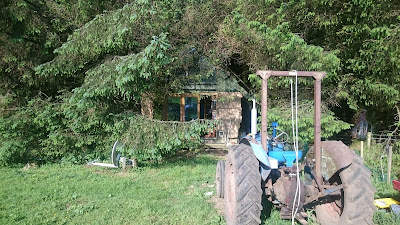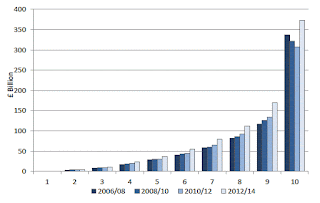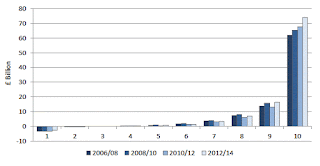 |
| Wealth. |
A lot of folk have commented excellently on the Scottish Growth Commission report. A lot of folk on the left have been critical. George Kerevan, in particular, has lambasted the SNP for promoting a regressive, over-cautious, Morningside-friendly version of Independence Lite, writing:
"Working-class folk, especially those who are unemployed, unskilled and dependent on benefits, are the most likely to vote SNP. They provided the bedrock of support in 2014 that nearly won us independence. The Rowntree report argues forcibly that unless the SNP directly address the needs and aspirations of this core demographic, they will lose support to Labour and the Tories."George is right, of course. I agree with him, of course. But actually, although I have many criticisms myself, I'm not too worried by this. From the point of view of an independence referendum, it doesn't matter. The SNP can wave their Growth Commission report in the faces of the 'soft no' voters in Morningside and Bearsden, Cramond and Newton Mearns. They may swing a few voters, and if they do, that's excellent.
But in the meantime, the left - Radical Independence, the SSP, RISE, even the Greens - can be presenting a far more radical, adventurous, egalitarian, internationalist vision of independence to working (and not-working) Scotland, and that's where the referendum will be won.
But that's also where the Growth Commission threatens to lose it for us. A report written to tempt the comfortable middle class does not go down well everywhere. Darren "Loki" McGarvie writes:
My analysis of the Labour party has been for years that while its core vote was working class, its parliamentarians - and particularly its front bench - are drawn largely from an Oxbridge-educated elite. Their parliamentarians don't socialise with their electorate; they don't understand them. Consequently they have to send out ethnographers to do focus groups to discover (often imperfectly) what their electorate thinks.
The Growth Commission report emphasises that the SNP have fallen into the same trap. Their electors, too, are largely working class - and largely urban working class. Yet their parliamentarians are bankers, lawyers, journalists; suit-wearers. The Growth Commission report speaks to Morningsiders because SNP politicians are themselves Morningsiders. It doesn't speak to Easterhouse or Castlemilk because SNP politicians don't socialise with Easterhouse or Castlemilk.
This is the root of SNP timidity. They think the time is not right for a referendum because, in the circles in which they move, the time is not right for a referendum. They think caution, fiscal prudence, independence-lite will swing the vote because for the people with whom they socialise that is what would swing the vote.
"the party I once voted into power, believing they could deliver an imaginative, “trouble-making” form of independence, have produced an economic prospectus so demoralisingly timid... if the big idea is simply to rebrand the fundamentals of the UK economy, so that independence becomes more attractive to those whose entrenched advantages are threatened by a radical alternative, well, that’s a very different proposition, isn’t it?"Loki usually irritates me, but he represents a large section of 'soft yes' opinion; and in this piece he's only saying what I have said myself many times: independence which changes nothing is worth nothing. The very document which may win us a few 'soft no' voters threatens to lose us a lot more 'soft yes'.
My analysis of the Labour party has been for years that while its core vote was working class, its parliamentarians - and particularly its front bench - are drawn largely from an Oxbridge-educated elite. Their parliamentarians don't socialise with their electorate; they don't understand them. Consequently they have to send out ethnographers to do focus groups to discover (often imperfectly) what their electorate thinks.
The Growth Commission report emphasises that the SNP have fallen into the same trap. Their electors, too, are largely working class - and largely urban working class. Yet their parliamentarians are bankers, lawyers, journalists; suit-wearers. The Growth Commission report speaks to Morningsiders because SNP politicians are themselves Morningsiders. It doesn't speak to Easterhouse or Castlemilk because SNP politicians don't socialise with Easterhouse or Castlemilk.
This is the root of SNP timidity. They think the time is not right for a referendum because, in the circles in which they move, the time is not right for a referendum. They think caution, fiscal prudence, independence-lite will swing the vote because for the people with whom they socialise that is what would swing the vote.
Of course, if the SNP do dawdle, dally, and delay the referendum until after the next Holyrood election, George is right and I am wrong. The SNP have over the past decade run Scotland considerably better than any of their predecessors, but they have also made mistakes, and there are several policy areas on which they are now looking a little tired.
If they delay until 2021, if they don't radically change direction to appeal to working Scotland, then there really will be no independence referendum for a generation, because there aren't enough 'soft no' voters in Morningside to balance a 'soft yes' that sees no benefit in an independence which changes nothing.
But to get down to detail of Growth Commission report, and to my own criticisms.
The report says:
"3.88 Maximising frictionless trade and market access with the rest of the UK and with Europe is of critical importance to the performance of the Scottish economy in the short and long term."This is almost certainly not possible, and absolutely certainly not in our gift. England and Wales (hereinafter EW - and note that I'm rather assuming we'll see a united Ireland before an independent Scotland) seem destined for a very hard crash out of the EU. Given that that is so, there will be a hard border between EW and any country which is in either the EU or EFTA. Scotland will have to choose which side of that border to be on. Do we choose the UK side, which makes independence virtually meaningless, or the EU side, which puts us into a community of 27 other nations many of a similar size to our own?
This decision is made harder by the fact that England sits squarely across our main trade route. Trade war with EW is precisely what undermined the Scottish economy before the 1706 union; it is a major risk. Scotland urgently needs its own Brexit Buster, like Ireland's. That means not just ships, but new port infrastructure (and transport links to it) at Grangemouth, Rosyth, possibly Aberdeen.
The Growth Commission report covers port facilities only in paragraphs A183 and A190; it doesn't mention the risk of trade friction in using EW as our main trade conduit - friction which could arise out of hostility but is equally likely to be simply a consequence of incompetence and dislocation of an economy collapsing under the weight of Brexit. For the commission not to have acknowledged this and allowed for it seems to me pretty remiss.
Related is the matter of currency. The report urges the idea of continuing to use Sterling for what seems to me a remarkably long period (10 years).
As Kirsty Hughes persuasively argues, using Sterling prevents us rejoining the EU during that period. If she's right (and I believe she is), shouldn't the Growth Commission have considered this? But even if she were wrong about EU membership, for a country which wishes to remain part of the European family to hitch itself to a currency set to diverge rapidly from it doesn't seem like a good plan.
I'm also bothered by the 'Annual Solidarity Payment'. It looks a lot like tribute; or like paying off a blackmailer. We shouldn't do this.
Article 38 of the Vienna Convention on Succession of States in respect of
State Property, Archives and Debts reads:
"1.When the successor State is a newly independent State, no State debt of the predecessor State shall pass to the newly independent State, unless an agreement between them provides otherwise..."So Scotland is not obliged to, and cannot be obliged to, pay a share of the UK debt. This doesn't mean we should not, but it does mean we cannot be forced to. The risk that concerns me is that EW will assume it is entitled to payments from Scotland, and will behave badly - for example, by holding up Scottish exports - in order to try to screw more money out of us.
The Growth Commission report compounds this problem by suggesting that we should continue to 'buy services' from EW as part of the 'Solidarity Payment', specifically including military services. For me, making a break from the UK's military traditions of bombast, adventurism, gunboat diplomacy is one of the most important reasons for independence. I don't think I'm alone. Again, UK foreign aid is increasingly being used to pursue the UK's geopolitical and commercial ambitions. Scotland should not be supporting UK foreign aid programmes (para B2.3).
But there's a more fundamental issue about the Growth Commission report: growth. Sustainable growth is physically possible only if you assign artificial financial values to intangible things. We currently do do this, but we shouldn't assume it's beneficial.
Does the Scottish economy need to grow at all? I'd argue it doesn't. According to 'Wealth and Assets in Scotland, 2006-2014', the total household wealth of Scotland is £865.6 BILLION - almost a trillion pounds.
I own ten acres of land, a car with 130k miles on it, a 55 year old tractor, five cattle, a little sailing boat, several computers, a lot of books, several bicycles, a home-built house you would call a hut, and some tools; total value £70,000 if I'm lucky. Yet, apart from mental health, I have an extraordinarily good life. I work about ten days a month. I eat well. I'm secure. There's nothing I need I don't have. Of course, I don't have a partner or children, but if I did have, it would not take three times my current wealth to provide all of us with a very comfortable life.
The average household wealth in Scotland - the arithmetic mean - is £360,666.67. You don't have that much? I'm not surprised. The problem isn't that Scotland is poor, the problem is that Scotland is unequal. Worse, Scotland is still steadily getting more unequal.
 |
| Chart of household wealth per decile over time, showing increasing inequality. |
40% of all households have no or negligible property wealth (and you can bet those are mostly the same folk as have no net financial wealth).
In fact, overall, this is how badly wealth in Scotland is distributed. Iif we shared Scotland's household wealth equally, 88% of households would benefit. Only 12% of households would lose. And that is before you count wealth held in tax havens and secrecy regimes.
So, going back to that average figure, £360,666.67. Suppose your household had that much wealth. Would you be able to live an extremely comfortable life?
I would think so.
If you couldn't, what is wrong with you?
Inequality is the elephant in the room of independence. A plan for independence which does not radically address inequality will not attract a majority of Scotland's voters. Any major constitutional change is a risk - as we are seeing with Brexit. People - perhaps Scots especially - are wary of risk. People take risks only when the potential benefit is considerable, and independence which changes nothing offers no benefits. We have to have an independence plan which offers the prospect of a radically fairer Scotland.
We can do that. It really isn't hard.
And if the overwhelming majority of us could live very comfortably indeed on a fair share of Scotland's wealth, why does Scotland's economy need to grow? Why is it seen as a political desideratum?
We cannot grow by resource consumption without destroying the future of the planet for our children. We cannot extract all the oil from under the North Sea without far exceeding the planet's ability to cope. We need to use the resources we do extract more thoughtfully. We need to waste less. We need use less. All this can be done without hurting anyone's standard of living.
In summary, if we made our political objective to make people's quality of life better, rather than to grow the economy, we have adequate wealth and would have, with independence, adequate tools to do that.
The question is, have we the will?



No comments:
Post a Comment